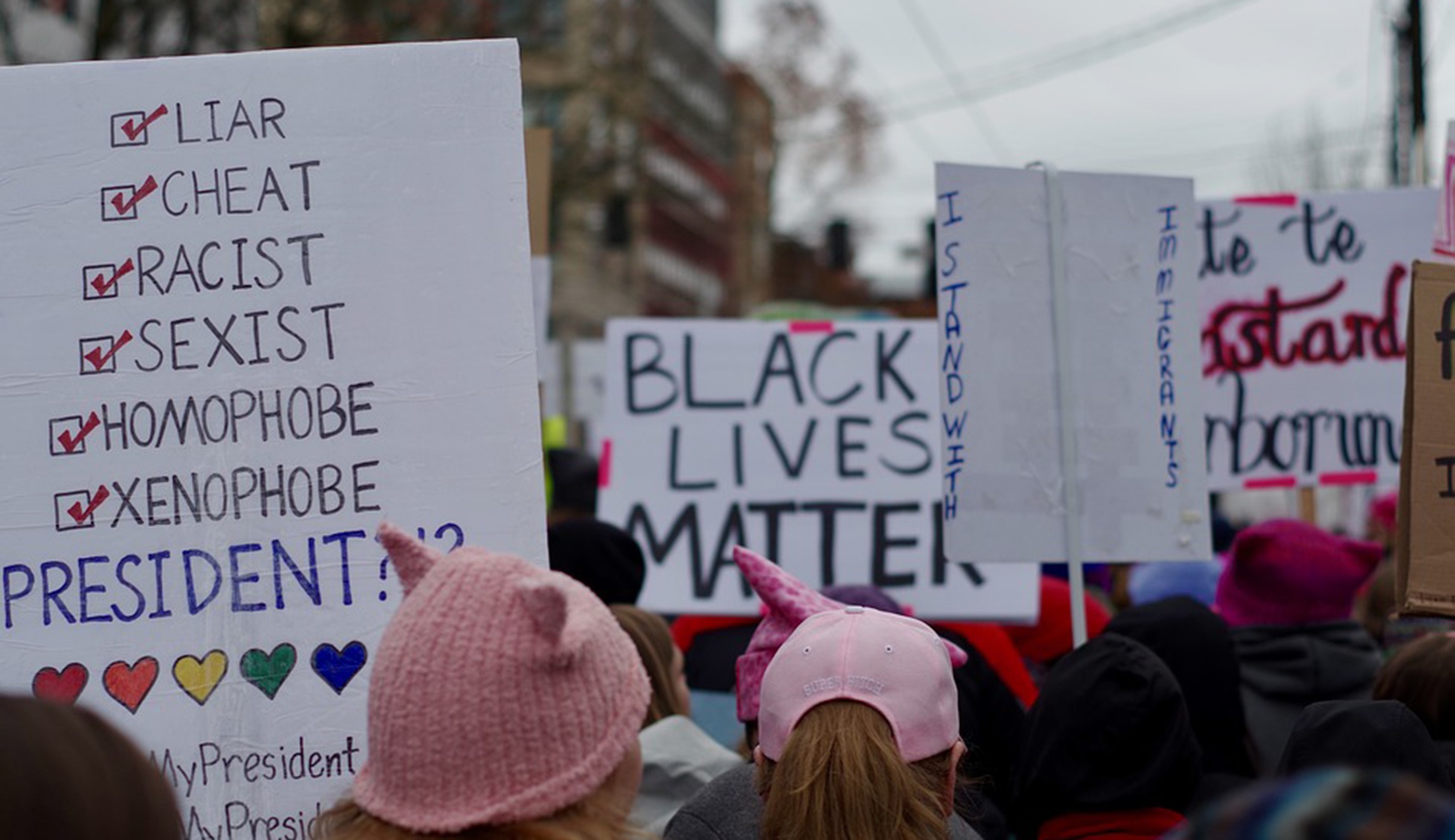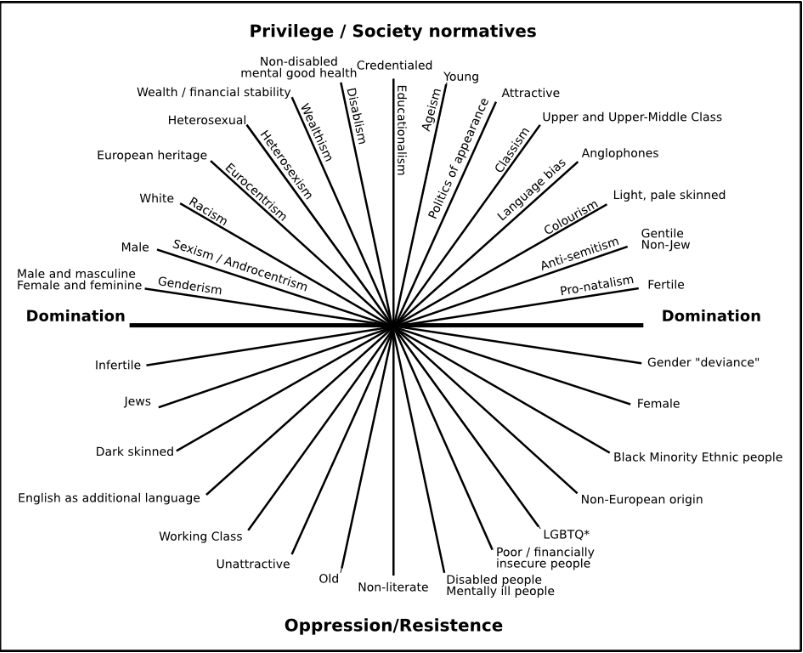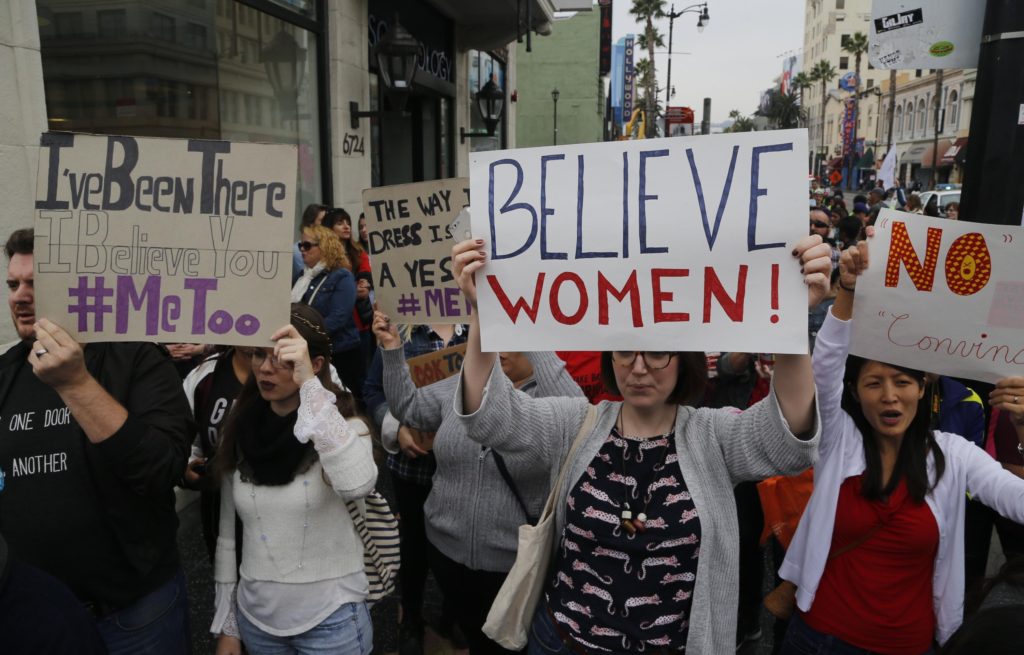
If you’re an academic or some sort of intellectual, you’re probably familiar with the phrase identity politics. Or with its near synonym social justice. Or with the more old-fashioned term, from the late 1980s and early 1990s, political correctness. What is identity politics, exactly? Where did it come from? What are its methods, effects, and consequences? Is it justified? What sustains it?
Oppression, Activism, and Social Justice
Identity politics is activism driven by oppression narratives framed around “identity.” But not just any old identity. Rather, “identities” defined in terms of largely immutable characteristics—race, gender, sexual orientation. The Cambridge English Dictionary defines identity politics as follows:
political beliefs and systems that place a lot of importance on the group to which people see themselves as belonging to, especially according to their race, gender (= whether they are male or female), or sexual orientation (= whether they prefer to have sexual relationships with people of the same or a different gender).
The Merriam-Webster Dictionary defines identity politics as:
politics in which groups of people having a particular racial, religious, ethnic, social, or cultural identity tend to promote their own specific interests or concerns without regard to the interests or concerns of any larger political group.
It adds a quotation from NYU professor and feminist activist Catharine R. Stimpson:
Identity politics is contemporary shorthand for a group's assertion that it is a meaningful group; that it differs significantly from other groups; that its members share a history of injustice and grievance; and that its psychological and political mission is to explore, act out, act on and act up its group identity.
The entry in the Stanford Encyclopedia of Philosophy for identity politics begins:
The laden phrase “identity politics” has come to signify a wide range of political activity and theorizing founded in the shared experiences of injustice of members of certain social groups. Rather than organizing solely around belief systems, programmatic manifestos, or party affiliation, identity political formations typically aim to secure the political freedom of a specific constituency marginalized within its larger context. Members of that constituency assert or reclaim ways of understanding their distinctiveness that challenge dominant oppressive characterizations, with the goal of greater self-determination.
In these examples, we see two main components:
(1) The Oppression Narrative: “[T]he shared experiences of injustice of members of certain social groups.”
(2) The Activist Prescription: “Members of that constituency assert or reclaim ways of understanding their distinctiveness that challenge dominant oppressive characterizations.”
The first of these is an empirical claim to the effect that “certain social groups” are subjected to “injustice” (or “oppression,” and so on). This empirical claim may be true. It may be false. The second of these is a prescription related to activism, aimed at modifying, changing, or even revolutionizing societies so as to remove the alleged injustice. This aim is usually referred to as “social justice.”
Where Identity Politics Came from
Identity politics originated in the late 1960s, among movements which grew rapidly, particularly within academia, during the 1970s. The social groups alleged to experience specific injustices are women, racial minorities, and sexual minorities. Correspondingly, the main forms that such activism have taken are feminism, racial activism, and LGBT activism.
"This fundamental irrationality is the key to understanding the ascendancy of identity politics and, despite its falsity, the immense difficulty in combating it."
By way of illustration, consider the development of feminist identity politics since its sudden appearance and sharp rise from the late ‘60s. There is Valerie Solanas’ SCUM Manifesto (1967), the “Redstockings Manifesto” (1969), Carol Hanisch’s “The Personal Is Political” (1969), Kate Millett’s Sexual Politics 1970), Germaine Greer’s The Female Eunuch (1970), Andrea Dworkin’s Woman Hating (1974), Susan Brownmiller’s Against Our Will: Men, Women and Rape (1975), “The Combahee River Collective Statement” (1978), Zillah Eisenstein’s Capitalist Patriarchy and the Case for Socialist Feminism (1979), Catharine MacKinnon’s Sexual Harassment of Working Women (1979), Dworkin’s Pornography: Men Possessing Women (1981), the Duluth Model (1981), Koss et al.’s “The Scope of Rape: Incidence and Prevalence of Sexual Aggression and Victimization in a National Sample of Higher Education Students” (1987), Peggy McIntosh’s “White privilege and male privilege: A personal account of coming to see correspondences through work in women’s studies” (1988), and her “White Privilege: Unpacking the Invisible Knapsack” (1988), Carol Pateman’s The Sexual Contract (1988), Kimberle Crenshaw’s “Demarginalizing the Intersection of Race and Sex” (1989), Judith Butler’s Gender Trouble: Feminism and the Subversion of Identity (1990), MacKinnon’s Only Words (1993), and Ellen Pence’s and Michael Paymar’s Education Groups for Men Who Batter: The Duluth Model (1993).
Of course, similar lists could be given concerning racial identity politics, as well as LGBT identity politics.
In addition to the big three, there are other groups jostling for victimhood status, such as the disabled and the obese. By the early 1990s, the idea of intersectional identity politics, or intersectional social justice, appeared (see the aforementioned 1989 work by Kimberle Crenshaw). Instead of a single axis, as it were, of oppression or marginalization, there are multiple axes of oppression, marginalization, and privilege. Just how “privileged’ or “oppressed” one might be is then a complex matter of working out how many “privilege” points one has, and how many “oppression” or “victim” points one has. For example, at The National Career Development Association, one finds a discussion of intersectionality, along with what activists call the “oppression wheel”:

Such views characterize America’s cultural left, in what is referred to as the “culture wars.” There are also identity politics movements of right-wing political orientation. These are easier to describe, the relevant “social group” being either national identity or racial identity (in the latter case, white identity). Racial identity politics on the right has come to be termed identitarianism and is closely associated with what is known as the alt-right. The influence of such movements is very small in the United States, but it is somewhat different in Europe: tiny in the West, and stronger in the East.
And certainly, there are also, broadly speaking, left-leaning nationalist movements in Europe and in Canada (for example, Scottish, Welsh, and Irish nationalists in the United Kingdom; Catalonian and Basque nationalists in Spain; Parti Québécois and Québec Solidaire in Canada).
A related phenomenon is the emergence and growth of what Roger Eatwell and Matthew Goodwin call “national populism.” The main thrust of national populism, though, tends to emphasize some kind of monoculture. The outcome serves to decrease divisive splintering into smaller minorities that assert victimhood claims.
Practices and Methods
Two obvious examples of practices connected to identity politics are “believe women” and affirmative action. The first has a close relation to its associated epistemology, that is, standpoint epistemology. The second is the standard means by which the alleged injustice is to be remedied. According to standpoint epistemology, the standpoint of the “oppressed” is unchallengeable truth: if, for instance, a woman says it is so, then it is so. The immediate consequence of this approach is the elimination of due process and the need for evidence. As Alan Dershowitz has quipped, “Innocence is no longer a defense.”
The threat of reducing the target to ostracized penury is very real. My own profession (academic philosophy) has seen years of “social justice” mobbings, witch hunts, and online campaigns, some more successful than others. Early this year Bo Winegard, Assistant Professor of Psychology at Marietta College, was terminated from his tenure-track position for venturing into the area of racial differences. Activists documented some of his writings and social media comments, and mobilized his employers to have him removed. Recently, Nathan Cofnas, an Oxford DPhil philosophy student, met with an online campaign aimed at “ruining his reputation,” all because he’d published an article on innate group differences in intelligence.
Last year, Cambridge research fellow Noah Carl was purged from his academic position because he’d published on the same controversial subject. As is well-known, Charles Murray (co-author of The Bell Curve) has been subjected to similar treatment for more than two decades. Thanks to capitulation to an outrage mob, Jordan Peterson, the prominent Canadian academic psychologist and author of 12 Rules for Life: An Antidote to Chaos, had a fellowship invitation at Cambridge rescinded.
In 2018, Sarah Braasch, a Yale PhD student, was vilified by an activist mob, as a result of a late-night incident involving a black student sleeping outside her dorm room. Having reported the student to security, Braasch was falsely accused of “racial harassment.” The matter was videotaped and put online, and there followed an attack campaign in the national press, effectively destroying her life. Also in 2018, physicist Dr Alessandro Strumia, of the European Organization for Nuclear Research, gave a presentation disputing the narrative that women face discrimination or bias in his discipline. He was immediately subjected to a mobbing and disciplined.
In 2017, philosophy academic Dr Rebecca Tuvel, having published an essay on the topic of “trans-racialism,” was subjected to an outrage mob. In the same year, Google software engineer James Damore distributed, at his employer’s request, learned and thoughtful comments on their “diversity policy.” With the identity politics crowd on his tail and an employer keen to protect its reputation, he was fired from his job.
In 2015, Nobel Prize winning biologist Sir Tim Hunt was smeared on social media by a loathsome pseudo-academic, on the basis of a gentle joke he told at a scientific conference in South Korea about people “falling in love” in the lab. Then he was promptly run out of his academic positions at University College London and the Royal Society. Also in 2015, at Northwestern University, cultural and film studies Professor Laura Kipnis was subjected to a malevolent Title IX accusation for writing an online piece questioning the ideas behind contemporary “believe women” activism. (The individual she briefly referred to, a philosophy professor at Northwestern, was forced to resign after a number of women accused him of sexual harassment; as Kipnis later went on to detail in a 2017 book, these accusations do not seem credible).
In 2014, Professor David Barnett, of the University of Colorado, was forced to resign from his position simply for defending a student of his who had been falsely accused by a very sexually aggressive and dishonest female student. In 2013, I myself (at the time, at the University of Oxford) was falsely accused of “harassment” by a female stalker who tragically committed suicide when her boyfriend ended their tumultuous relationship. Subsequently, a feminist mob was recruited by activists and I was slandered, cyber-harassed, and driven out of town.
There are many other cases, far too many to mention here. But the general pattern is clear and usually plays out in a similar way: Whether as a result of a demonstrably false accusation, or as a result of an accusation of thought-crime, the target is denounced, driven out, and blacklisted.
Is Identity Politics True?
Given the severity and brutality of these practices, what may be said either for or against this body of ideology, now so prevalent? Are women oppressed by a tyrannical system, of laws and male power, which they call the “patriarchy”? Do (the very few) outcome differences that seemingly disadvantage women reflect a systematic “bias”? The answer is no. Women are not oppressed. There is no patriarchy. A woman in a Western liberal democracy has every right a man has; furthermore, she benefits from favors, privileges, and protections that men cannot dream of: one need only examine data pertaining to the education, welfare, legal, and criminal justice systems to see that this is so. By and large, the measurable outcome differences disadvantage men, not women.
Are sexual minorities—gay men, lesbians, the transgendered—oppressed? Again, no. There’s some public hoo-ha about transgenderism. But in reality, this is inconsequential noise.
What about racial minorities? Race activists claim that blacks are oppressed by the police, by various institutions, and by the state. But the evidence for this is no longer convincing. To be sure, it was true enough back in the 1950s, when restrictions on association and segregation were in place. But in the second decade of the twenty-first century, the black oppression narrative is just not true.
And yet, despite the falsity of the narrative, the ascendancy of identity politics continues. Indeed, it dominates education, the welfare systems, and academia. In the last few years, this dominance has extended throughout the legal system, the media, literary writing, the entertainment world, and private corporations. Identity politics, with slogans like “diversity and inclusion,” has been adopted rather enthusiastically by what old-style socialists would call “the ruling elite”: big corporations, the police, the legal world, the media. All implement authoritarian policies and rules, including affirmative action, diversity training, speech codes, “sexual harassment” measures, denial of due process.
The Moral Foundation of Identity Politics
Karl Popper famously argued that Marxism is unfalsifiable. Since it gave no definite prediction that could be tested, and any seeming prediction could always be “immunized” against refutation or be “explained away,” there was no method by which Marxist theory, once adopted, could be rejected or rationally removed. No doubt Popper appreciated that at least some of the empirical claims involved were true: disparities of wealth, poor health of workers, and so forth. These were (and to some extent still are) true, but that was always common ground to all disputants. What made Marxist socialism special was its claim to provide a scientific view of history, progressing via class struggle towards an ultimate revolution, a “withering away of the state” and arrival of a workers’ utopia. It is these claims that Popper diagnosed as unfalsifiable.
But it seems to me that the situation with identity politics is not analogous. Again, the oppression claim of feminism is manifestly false: women aren’t oppressed; they do not suffer from disadvantages. Instead, as I’ve already noted, it is clearly men who suffer from disadvantages on most social well-being indicators: homelessness, incarceration, punishment, suicide, early death, minority in higher education, family courts, denial of due process. Nor are racism and discrimination against sexual minorities more than statistically trivial issues.
Why, then, does identity politics maintain such a powerful stranglehold?
The driving force behind the rise of identity politics, I am inclined to believe, is a form of intense moralistic righteousness and communitarianism (which explains its appeal to some conservatives also), akin to a Puritan cult. A somewhat religious fetishization of victimhood—“The Superior Virtue of the Oppressed,” as Bertrand Russell dubbed it in a 1937 essay. A Puritanical desire to be cleansed of “sin.” It is no coincidence, surely, that this cult of “social justice” took hold of the American “atheism community” about a decade ago (2011), producing increasingly bizarre obsessions regarding “racism,” “sexism,” “sexual harassment,” and so on.
It is this moralization that makes identity politics different from its class-oriented predecessor—though it is worth noting Nietzsche’s view that socialism is secularized Christianity. Perhaps social justice identity politics is simply the natural successor, and equally a form, of secularized Christianity. At any rate, the oppression narratives of identity politics are powerful moral commitments, engaging intense moral drives, including the desire to punish. And it follows that dissent from the creed is a kind of blasphemy.
Under twentieth-century Communism and Nazism, dissent was also criminal. But that was because dissent represented a threat to the power of the party. Under identity politics, by contrast, there is no party. Comparisons between Marxism and religion were commonplace by the 1940s, and certainly these were deserved. With respect to identity politics, though, the best explanation is that it’s a different sort of quasi-religious cult, which arose from Puritan Christianity. Again, the cult is bound together by a deep moral commitment to certain ideas, indeed to the purity of such ideas, with the natural concomitant of necessary punishments for sinners. This fundamental irrationality is the key to understanding the ascendancy of identity politics and, despite its falsity, the immense difficulty in combating it.

